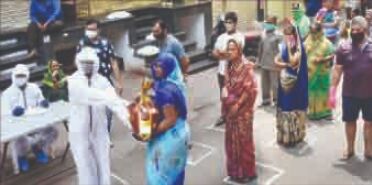Self-dignity and active participation
- By : Anirban Ganguly
- Category : Articles

India’s exemplary fight against the COVID-19 pandemic is based on well established democratic principles of self-dignity and active participation by all its constituents
Consignments of the anti-malarial Hydroxichloroquine have begun to be shipped from India and have started reaching its destination. Brazilian President Bolsonaro’s request was perhaps the best articulated, civilisationally and in terms of ethos. At this critical hour, HCQ, of which India is the leading producer, is proving to be the ‘Sanjeevani’ of yore, the mystic resuscitative herb of the epic Ramayana. India produces 70 per cent of the world’s supply and retains capacity of producing 40 tonnes of it every month, which means, as per the Indian Pharmaceutical Alliance (IPA), 20 crore tablets of 200 mg each. In terms of production, Indian companies have the capacity to ramp up production in times of need. Having assured production and supply line for domestic consumption, India decided to export it to countries in the neighbourhood and across the globe, especially to those who have made a desperate appeal to India.
Since India’s rise and global outreach is not driven by the concept of the “century of humiliation” and since she has consistently felt and displayed — especially in the years since Prime Minister Modi came to the helm — a constructive and credible global outreach, India responded with alacrity to these appeals. In the approach to the pandemic, in laying out protocols, in working out details, in implementing it across a country so diverse and vast, in uniting a nation’s collective will, in encouraging positive experimentation, in displaying a compassionate and sensitive dimension to handling this unprecedented crisis of our times, the Indian experience is indeed beginning to emerge as a distinct model. At a deeper level, PM Modi’s approach to the collective fight against the pandemic evokes and appeals to a deeper sense of dignity. Through his calls for clapping or lighting the lamp in silence, through his call for recognising the dignity of those at the frontline of this struggle, through his opening the PM-CARES fund, which has elicited donations from across the spectrum, from the richest capitalist to a number of socio-religious organisations, to retired private citizens donating their savings, to the little schoolboy, Prathampriyo from West Bengal, who emptied his piggy bank in response to PM’s appeal, Modi has channelised and revivified a spontaneous and palpable unity.
Francis Fukuyama speaks of an “evolving concept of dignity, in which recognition is due not just to a narrow class of people, but to everyone…” Modi’s approach has always been to widen this sense of dignity; his approach in these last few weeks has reinforced that. He has induced a collective recognition which is wide. The ‘Corona Warriors’ movement, for example, which has seen a huge response and the appreciation given to them, was a manifestation of that. It is this dignity that Modi has recognised and evoked in citizens who, propelled by it, have come forward to lend a hand or applaud. The ‘Pradhan Mantri Gareeb Kalyan Jojana’s’ essence is the imparting of this recognition. An entire system was in place and began moving to work out its implementation. For instance, 8 crore farmers were targeted for disbursing an amount of Rs 16 thousand crores, at the time of writing this, Rs 12,771 crore has already been disbursed to 6.39 crore beneficiaries. To take another example of recognition and dignity, the insurance announced by Prime Minister Modi under this scheme, for government hospitals and health care centres health-workers had as target 22.12 lakh beneficiaries and an amount of Rs 130.508 crore to be disbursed for the purpose. The implementation has already been worked out through relevant agencies by the end of March itself. PM Modi’s ‘Jaan bhi, Jahan bhi’ mantra or observation, that both life and livelihood need to be protected and saved, has pithily and earthily articulated that fundamental objective of imparting security and dignity to the most marginalised and to those at the forefront of this epic battle against an unseen and alien adversary. It exudes a very Indian approach.
If, as Fukuyama argues, freedom also means “the ability to exercise a share of power through active participation in self-government”, then that participation has become even more intense these days. In every decision Modi has taken, he has not only engaged with an array of experts and practitioners and stakeholders across the board but he has also elicited the participation of the ordinary Indian, crucial constituents who, he knows will contribute to the ultimate success of this struggle. He has sought the active involvement of citizens; he has asked and appealed to them to carry out their duties towards the eventual victory against the virus. His appeals and exhortations have seen an overwhelming response.
India’s response from the time the pandemic came into public focus has also been measured and timely and displayed a high degree of awareness and preparedness. A certain political section and peddlers of fake narratives, for instance, initiated a false campaign on India’s slow response; their intention was to spread panic since their politics survive on fear-mongering. The facts were otherwise, they gave out a different story. The WHO was alerted by China on December 31. On January 7, 2020, China identified the Coronavirus and on January 8, India had initiated the first steps and the meeting of the first joint monitoring group was held. On January 17 itself, advisories were issued to all states for initiating and ramping up the health sector preparedness, for point of entry surveillance, a Group of Ministers (GOM) began meeting since February 3 to assess and act on the evolving situation and strategic preparedness at various levels. Eleven empowered groups were constituted to implement the strategy on the ground while state Health Ministers and Secretaries were repeatedly engaged and reached out to.
Even in these unprecedented times, some elements continue to remain active by keeping their shops for fabricating falsities open, despite the lockdown. They abhor India’s global recognition and activism. So they spoke of the “shortage” of HCQ for domestic use; they spoke of the ineffectiveness of the lockdown, whereas globally, India’s lockdown has come across as among the most timely and effective. They spoke also of a surveillance state the moment the ‘Arogya Setu’ app was launched but it saw an overwhelming response and by April 8, there were around 10 million downloads for the app. A movement had spontaneously picked after Prime Minister’s appeal to generate greater awareness on the need to install this crucial app for one’s well being and safety. They displayed disdain at those who wished to light lamps for demonstrating solidarity with the marginalised, only to realise how the vast multitudes across states, small towns, hamlets, mountains, rivers and fields responded to PM Modi’s call to light the lamp at nine for nine minutes. At every step, they have been ignored or proven wrong.
The struggle against the pandemic in India is essentially and fundamentally based on and driven by dignity, recognition of dignity and active self-participation. Some, for obvious reasons, both past and present, will not understand it.

















